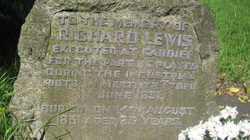Dic Penderyn

Dic Penderyn (Richard Lewis)
1808 – 1831
Folk hero executed after the Merthyr Rising of 1831.
For over a week in the summer of 1831, the authorities lost control of Merthyr Tydfil. With the town already a hotbed of political unrest, news that the ironmaster William Crawshay was to cut his workers’ wages was the spark that ignited the flames of rebellion.
Troops of the Argyll and Sutherland Highlanders were sent to put down the rioters. In an ugly confrontation in front of the Castle Hotel, as many as twenty people were shot dead.
Along with the Newport Rising eight years later, it was one of the most serious violent outbreaks witnessed on mainland Britain. It is also claimed to be the first time that a red flag was waved as a banner of workers power.
In the aftermath of the disturbance, a 23 year-old miner by the name of Richard Lewis was arrested and imprisoned. Better known as Dic Penderyn, he was originally from Aberavon and was typical of the men who had flocked to Merthyr, then the largest town in Wales, to find work.
Dic was accused of wounding Donald Black, one of the Scottish soldiers. The evidence against him was slender and Black himself apparently could not identify his assailant. Nevertheless, at his trial in Cardiff, Dic Penderyn was sentenced to the gallows.
Historians have argued that the authorities were worried about the potential power of the trade unions emerging in the newly industrialised parts of Wales. As an outspoken and intelligent workingman, Dic Penderyn may well have been suspected of being a union ringleader. Although 28 people had been arrested, only he was sentenced to death.
Despite the please of several well connected Welshmen that Dic Penderyn’s life should be spared, the Home Secretary Lord Melbourne showed no mercy.
Thousands of people accompanied his coffin on its journey from Cardiff back to Dic’s home at Aberavon. Whether deliberately or through incompetence, a martyr had been created.
1808 – 1831
Folk hero executed after the Merthyr Rising of 1831.
For over a week in the summer of 1831, the authorities lost control of Merthyr Tydfil. With the town already a hotbed of political unrest, news that the ironmaster William Crawshay was to cut his workers’ wages was the spark that ignited the flames of rebellion.
Troops of the Argyll and Sutherland Highlanders were sent to put down the rioters. In an ugly confrontation in front of the Castle Hotel, as many as twenty people were shot dead.
Along with the Newport Rising eight years later, it was one of the most serious violent outbreaks witnessed on mainland Britain. It is also claimed to be the first time that a red flag was waved as a banner of workers power.
In the aftermath of the disturbance, a 23 year-old miner by the name of Richard Lewis was arrested and imprisoned. Better known as Dic Penderyn, he was originally from Aberavon and was typical of the men who had flocked to Merthyr, then the largest town in Wales, to find work.
Dic was accused of wounding Donald Black, one of the Scottish soldiers. The evidence against him was slender and Black himself apparently could not identify his assailant. Nevertheless, at his trial in Cardiff, Dic Penderyn was sentenced to the gallows.
Historians have argued that the authorities were worried about the potential power of the trade unions emerging in the newly industrialised parts of Wales. As an outspoken and intelligent workingman, Dic Penderyn may well have been suspected of being a union ringleader. Although 28 people had been arrested, only he was sentenced to death.
Despite the please of several well connected Welshmen that Dic Penderyn’s life should be spared, the Home Secretary Lord Melbourne showed no mercy.
Thousands of people accompanied his coffin on its journey from Cardiff back to Dic’s home at Aberavon. Whether deliberately or through incompetence, a martyr had been created.
